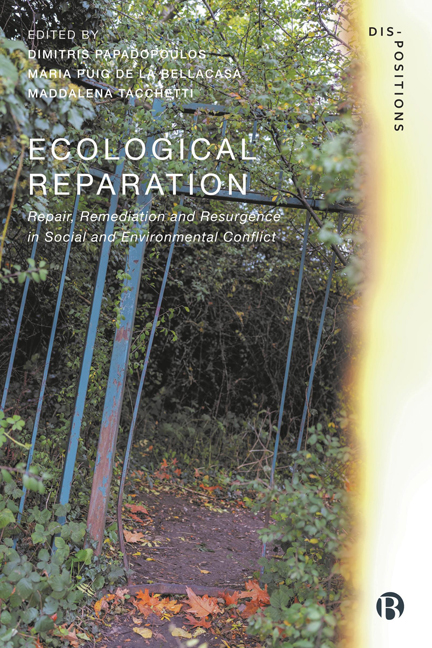Book contents
- Frontmatter
- Contents
- List of Figures
- Notes on Contributors
- Acknowledgements
- Note on the Figures
- Dis-Positions Series Preface
- Introduction: No Justice, No Ecological Peace: The Groundings of Ecological Reparation
- PART I Depletion<>Resurgence
- PART II Deskilling<>Experimenting
- PART III Contaminating<>Cohabiting
- PART IV Enclosing<>Reclaiming Land
- PART V Loss<>Recollecting
- PART VI Representing<>Self-governing
- PART VII Isolating<>Embodying
- PART VIII Growth<>Flourishing
- Index
4 - Reflections on a Mending Ecology through Pastures for Life
Published online by Cambridge University Press: 28 March 2024
- Frontmatter
- Contents
- List of Figures
- Notes on Contributors
- Acknowledgements
- Note on the Figures
- Dis-Positions Series Preface
- Introduction: No Justice, No Ecological Peace: The Groundings of Ecological Reparation
- PART I Depletion<>Resurgence
- PART II Deskilling<>Experimenting
- PART III Contaminating<>Cohabiting
- PART IV Enclosing<>Reclaiming Land
- PART V Loss<>Recollecting
- PART VI Representing<>Self-governing
- PART VII Isolating<>Embodying
- PART VIII Growth<>Flourishing
- Index
Summary
Above all, repair occupies and constitutes an aftermath, growing at the margins, breakpoints and interstices of complex sociotechnical systems as they creak, flex and bend their way through time. It fills in the moment of hope and fear in which bridges from old worlds to new worlds are built.
Jackson, 2014: 223I’m a researcher in STS or Science and Technology Studies. And so, I have the privilege of doing what we anachronistically call ‘field work’ – or, I might say, the chance to encounter people and things in their ordinary settings. I’m interested in witnessing the way in which people are navigating and doing socio-ecological change. In the summer of 2019, I visited 17 different farms, scattered across the UK: from Fife, in Scotland, to Devon in the south-west of England. I had the chance to talk at length to each farmer, or sometimes to a pair of farmers, on each farm, and to take a walk around the farm so that they could show me the work that they were doing. The farms were varied in size and in the diversity of their farm work, but they all had a few things in common. They were all rearing cattle for eventual sale as beef; they were all feeding their animals exclusively on grass pastures; and they were all following, more or less strictly, the guidelines of an organization that supports this practice – the Pasture-Fed Livestock Association (PFLA).
It doesn’t seem a very remarkable practice – to feed your cattle on pastures! But in this chapter, I narrate the actions of these farmers in a particular way (and perhaps, problematically, in a way that they may not recognize). I narrate their practices as ‘mending ecologies’. Mending ecologies is my preferred term, rather than say repairing ecologies, since mending denotes a mundane, lay activity, not necessarily requiring specialist skills. Mending requires observation (of what has broken down) and a focused amount of care (to mend and re-materialize). I suggest that the PFLA farmers are attempting to mend ecologies as they rear their cattle. As they do so, they contribute to a deep re-materialization of the ecology of the farm, including its socio-technical, non-human and human elements. Mending ecologies are therefore low-key, steady and care-ful actions.
- Type
- Chapter
- Information
- Ecological ReparationRepair, Remediation and Resurgence in Social and Environmental Conflict, pp. 75 - 89Publisher: Bristol University PressPrint publication year: 2023

